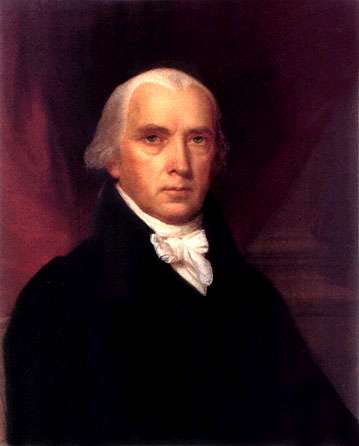James Madison
(Not to be confused with The Presidents of the United States of America)
Thomas Jefferson ← James Madison → James Monroe

James Madison was one of the Founding Fathers. He presided over the War of 1812, wherein much of Washington D.C. was burnt down;[1] fortunately for him this happened after he had already been elected to a second term. Many things were named after him, including New York City's Madison Square Garden. Also, there are brands of ice cream and snack cakes named after his wife, Dolley (a famous hostess).
He was one of the main authors of the Constitution (more like the main author, really). A political theorist in his own right, he also wrote more than a third of the Federalist Papers that supported its ratification; these contain some of the most important Papers (particularly the oft-quoted Federalist No. 10 and No. 51), providing philosophical and practical defenses of limited government, federalism, checks and balances, and the very idea of having a republic encompassing a massive chunk of the world's third-largest continent. Much of this, incidentally, was heavily influenced by the work of Niccolo Machiavelli, in whose work Madison and John Adams were intensely interested. He was also responsible for the Bill of Rights, which won support of the Constitution from several wavering states via the addition of the first ten amendments.[2]
Known as both "Father of the Constitution" and "Father of the Bill of Rights", though he protested that first one.
Known also for being both exceedingly shy and exceedingly short. Exceedingly exceedingly short. In fact, at 5 feet 4 inches (163 centimeters), he's still today the shortest person to ever serve as President.
One of only two Presidents from Princeton University, in contrast to the cavalcade of Harvard and Yale alums who've had the job. Of the two, Madison is definitely the least controversial.
A one-minute summary of some of his accomplishments can be found here.
- ↑ Just the government buildings, and only in retaliation for American burning of civilian property in Toronto.
- ↑ He was actually quite reluctant to support the Bill of Rights because he felt that an explicit protection of rights actually reduced the rights of the people and states, by implying that rights not explicitly protected are not protected at all. Political expedience forced his hand, and the Ninth and Tenth Amendments were intended as a sort of barb saying "You idiots really didn't understand my original argument about this thing, did you?